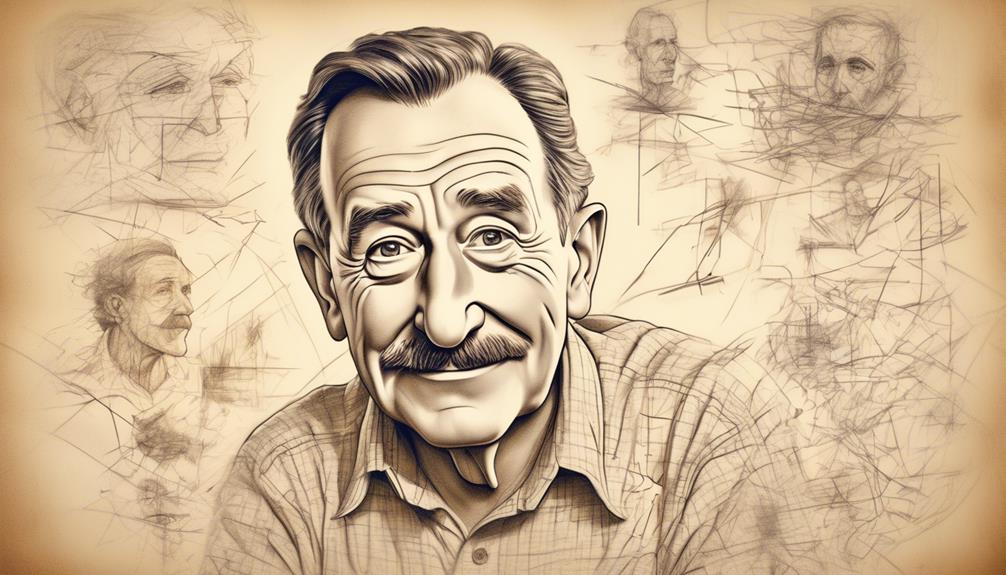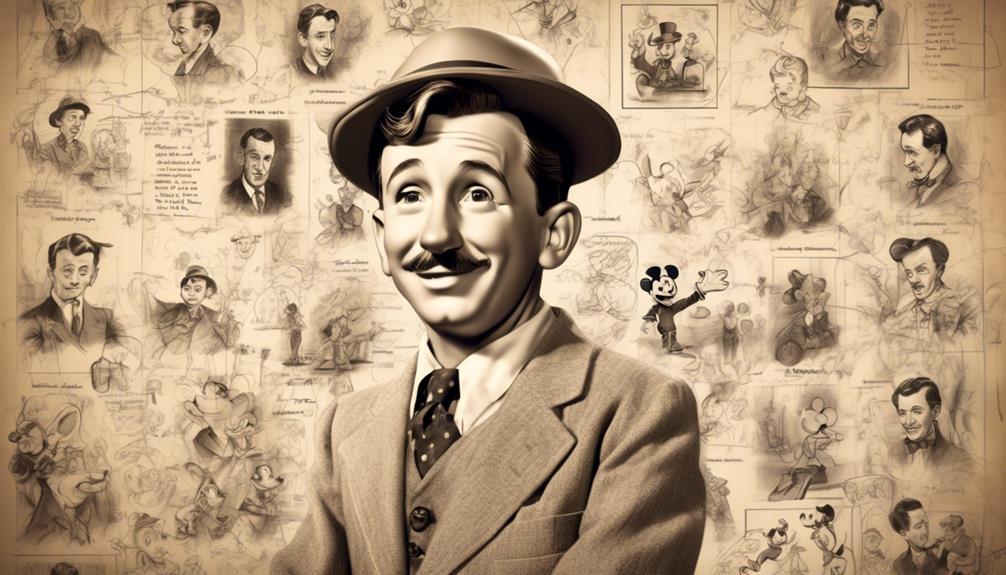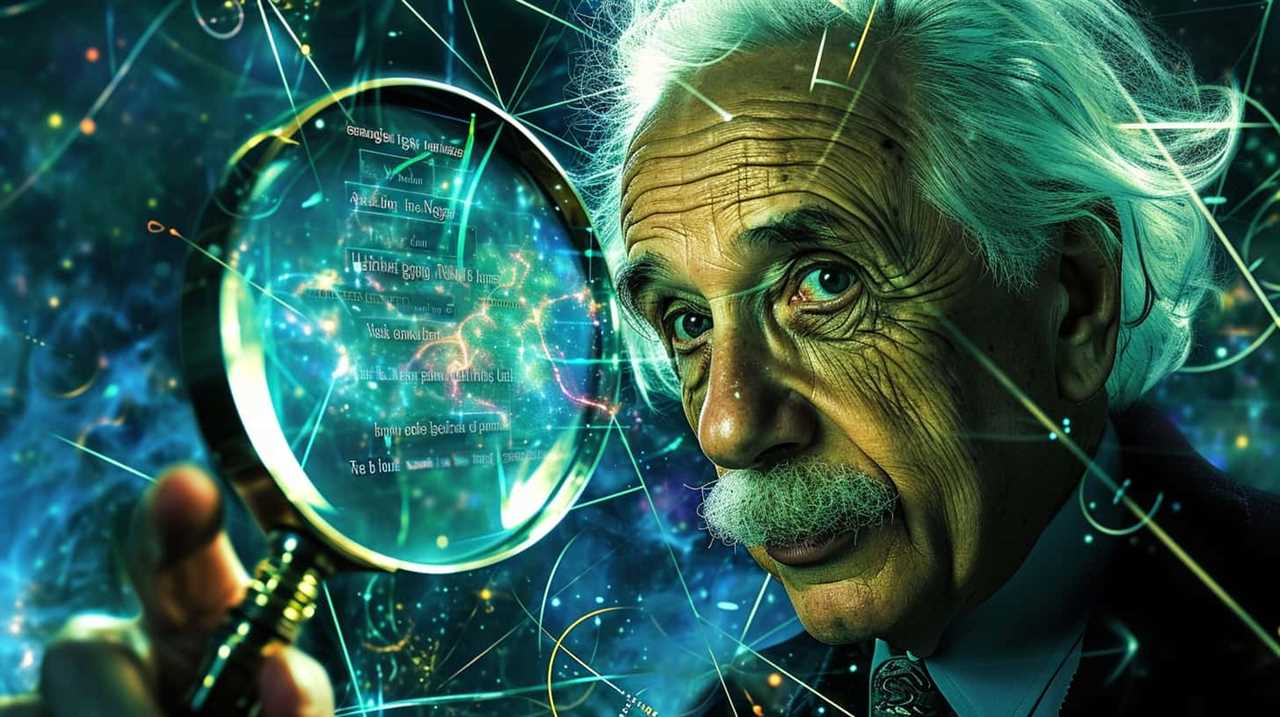Famous Personalities
Walt Disney Quotes – Famous Founder of Disney Company

In the universe of imagination and innovation, there resides a pioneer who turned fantasies into actuality. Walt Disney, the esteemed creator of the Disney Company, occupies a cherished spot in the lives of countless individuals. His heritage, serving as a beacon of inspiration, perpetually captivates and motivates us.
Through his words, we glimpse the profound wisdom and unwavering determination that propelled him to greatness. As we explore the timeless quotes of this remarkable pioneer, we embark on a journey of discovery and inspiration.
From the power of imagination to the importance of teamwork, Walt Disney's words resonate with a sense of possibility and wonder. Join us as we delve into the profound insights of this iconic figure and discover the magic that lies within his quotes.
Key Takeaways
- Imagination is a powerful tool for problem-solving and innovation.
- Dreams and ambitions are the starting point for success and can help overcome challenges.
- Innovation and adaptability are crucial for staying relevant and thriving in the entertainment industry.
- Hard work, dedication, and perseverance are essential for achieving goals and leaving a lasting legacy.
The Power of Imagination
Imagination is a powerful force that allows us to envision and create limitless possibilities. It plays a crucial role in problem-solving and is closely connected to innovation. When faced with a problem, our imagination allows us to think outside the box and explore unconventional solutions. It enables us to see beyond the limitations of the present reality and envision a future that's different and better.
Imagination fuels innovation by providing the spark that ignites new ideas and breakthroughs. It allows us to imagine what could be, pushing the boundaries of what's currently possible. Innovators like Walt Disney understood the importance of imagination in problem-solving and innovation. They embraced their imagination and used it to create iconic characters, stories, and theme parks that continue to captivate audiences today.
Imagination isn't limited to creative industries like entertainment; it's a vital skill in all aspects of life. Whether it's finding solutions to complex scientific problems or developing groundbreaking technologies, imagination is the catalyst for innovation. By tapping into our imagination, we can generate fresh ideas, challenge existing norms, and create a better future.
Dreams and Ambitions

Building upon the power of imagination, dreams and ambitions propel us towards new heights of achievement and fulfillment. Walt Disney, the famous founder of Disney Company, understood the significance of dreams and the determination needed to turn them into reality. He believed that dreams were the starting point for achieving success and that with hard work, perseverance, and a positive attitude, one could overcome any obstacle.
Disney's own life was a testament to the power of dreams and ambitions. From a young age, he had a vision of creating a magical world that would bring joy to people of all ages. However, his journey wasn't without challenges. He faced financial setbacks, rejections, and even the loss of his first animation studio. But Disney refused to give up. He used these obstacles as opportunities to learn and grow, ultimately achieving unprecedented success.
Disney's quotes reflect his unwavering belief in the importance of dreams and ambitions. He once said, "All our dreams can come true if we have the courage to pursue them." This quote encapsulates his philosophy of never giving up on one's dreams, no matter how difficult the journey may be. Disney understood that achieving success required resilience and the ability to overcome obstacles.
Creativity as a Driving Force
Creativity serves as the driving force behind the legendary works of Walt Disney.
By sparking imaginative ideas, Disney was able to create a world that captivated audiences of all ages.
His ability to cultivate artistic expression and inspire innovative thinking allowed him to revolutionize the entertainment industry and leave a lasting legacy.
Sparking Imaginative Ideas
One can't deny the profound impact that imaginative ideas have had on the world, driving us to think beyond boundaries and revolutionize the way we perceive and interact with our surroundings. Creativity serves as a driving force, sparking creative thinking and nurturing imaginative minds.
Here are three ways in which imaginative ideas have shaped our world:
- Pushing boundaries: Imaginative ideas challenge the status quo and encourage us to explore new possibilities. They push us to think outside the box and find innovative solutions to problems.
- Inspiring innovation: Imagination fuels innovation by inspiring us to create new technologies, products, and services. It allows us to envision a better future and motivates us to work towards turning those visions into reality.
- Transforming industries: Imaginative ideas have the power to transform entire industries. Think of how Walt Disney's imaginative ideas revolutionized the entertainment industry, creating magical experiences that continue to captivate audiences worldwide.
Cultivating Artistic Expression
Artistic expression, fueled by creativity, has the power to transcend boundaries and ignite a sense of wonder within us all.
Walt Disney, the famous founder of the Disney Company, understood the importance of cultivating artistic expression and harnessing creative inspiration. He believed that art had the ability to transport us to new worlds, allowing us to explore the depths of our imagination.
Disney encouraged his artists to push the boundaries of their creativity, constantly seeking new ways to bring their ideas to life. Through animated films, theme parks, and other forms of entertainment, Disney created a platform for artistic expression that continues to captivate audiences to this day.
His legacy serves as a reminder of the transformative power of creativity and the profound impact it can have on our lives.
Inspiring Innovative Thinking
Innovation serves as the driving force behind the inspiring and transformative work of Walt Disney, propelling the Disney Company to new heights of creativity and imagination. To foster imagination and promote innovative ideas, Disney embraced the following practices:
- Encouraging a culture of creativity:
- Walt Disney believed in creating an environment where employees were free to explore their ideas and take risks.
- This approach allowed for the development of groundbreaking concepts and experiences.
- Embracing experimentation:
- Disney understood the importance of trying new things and learning from failures.
- By encouraging experimentation, the company was able to push boundaries and constantly evolve its offerings.
- Collaborating across disciplines:
- Disney recognized the value of collaboration and sought to bring together individuals from different backgrounds and expertise.
- This interdisciplinary approach led to novel solutions and unexpected synergies.
Through these practices, Walt Disney and his company have inspired generations with their innovative thinking, leaving a lasting legacy in the world of entertainment and beyond.
Believing in Magic

Believing in the enchantment of the world around us, Walt Disney once said, "You can design and create, and build the most wonderful place in the world. But it takes people to make the dream a reality." This quote reflects Disney's belief in the power of imagination and the importance of collaboration in bringing dreams to life.
Disney was a firm believer in the magic that exists in the world. He understood that by embracing wonder, we can tap into our creativity and unlock endless possibilities. He encouraged his team to think outside the box and push the boundaries of what was considered possible. This mindset led to the creation of iconic characters, immersive theme parks, and groundbreaking animated films.
To further understand Disney's perspective on believing in magic and embracing wonder, let's explore some of his notable quotes:
| Quote | Meaning |
|---|---|
| "If you can dream it, you can do it." | Disney believed that our dreams have the power to become our reality. |
| "The more you like yourself, the less you are like anyone else." | Embracing our uniqueness allows us to create something truly special. |
| "Laughter is timeless, imagination has no age, and dreams are forever." | Disney recognized the eternal nature of laughter, imagination, and dreams. |
| "When you believe in a thing, believe in it all the way, implicitly and unquestionably." | Disney emphasized the importance of wholeheartedly believing in our dreams. |
| "All our dreams can come true if we have the courage to pursue them." | Disney encouraged us to have the courage to chase our dreams and make them a reality. |
Disney's quotes inspire us to believe in the magic within ourselves and in the world around us. By embracing wonder and unlocking our imagination, we can create wonders that surpass our wildest dreams.
Overcoming Challenges and Failures

Despite facing numerous challenges and setbacks throughout his career, Walt Disney persevered and ultimately achieved great success in the world of entertainment. He encountered various obstacles along the way, but instead of letting them deter him, he used them as opportunities for growth and learning. Here are three valuable lessons we can learn from Walt Disney's journey:
- Embrace failure: Walt Disney experienced multiple business failures, including bankruptcy and the loss of his first animation studio. However, he viewed these setbacks as stepping stones to success. He learned from his mistakes, adapted his approach, and never allowed failure to define him.
- Stay determined: Walt Disney's unwavering determination was a significant factor in his success. He faced numerous challenges, from financial difficulties to creative roadblocks, but he never gave up. He believed in his vision and worked tirelessly to bring it to life.
- Think outside the box: Walt Disney was known for his innovative thinking and willingness to take risks. He constantly pushed boundaries and sought new ways to captivate audiences. By thinking outside the box, he created timeless characters and experiences that continue to resonate with people of all ages.
Walt Disney's story teaches us that overcoming obstacles and learning from failures are essential ingredients for success. By embracing failure, staying determined, and thinking outside the box, we can overcome our own challenges and achieve greatness in our chosen fields.
Embracing Change and Innovation

Embracing change is a key aspect of Walt Disney's success story, as he constantly adapted and innovated to stay ahead in the entertainment industry. Disney's ability to adapt to change and embrace technological advancements played a significant role in the growth and success of his company.
| Adapting to Change | Embracing Technological Advancements |
|---|---|
| Constantly sought new ideas and approaches. | Embraced the use of sound and color in animation. |
| Recognized the need to diversify and expand into television and theme parks. | Utilized computer animation techniques in films. |
| Took risks and experimented with new storytelling techniques. | Embraced the use of digital technology for special effects. |
| Adapted to the changing tastes and preferences of audiences. | Developed interactive experiences through video games and virtual reality. |
| Embraced the shift towards streaming services and digital platforms. | Used social media and online marketing to reach a wider audience. |
The Importance of Hard Work

As we explore the subtopic of 'The Importance of Hard Work' in relation to Walt Disney, we'll examine two key points: work ethic and success, and perseverance and dedication.
Walt Disney's success wasn't achieved overnight; it was the result of his unwavering work ethic and determination. Through his relentless perseverance and dedication, he transformed his dreams into reality, leaving a lasting legacy in the world of entertainment.
Work Ethic and Success
Hard work is an essential component of achieving success, as it requires dedication, perseverance, and a strong work ethic. Here are three reasons why a strong work ethic is crucial for achieving our goals:
- Efficiency: When we work hard and put in the effort, we become more efficient at completing tasks. This allows us to accomplish more in less time, helping us move closer to our goals.
- Resilience: Success often requires overcoming obstacles and setbacks. A strong work ethic helps us develop the resilience needed to persevere through challenges and stay focused on our goals.
- Growth: Hard work pushes us out of our comfort zones and helps us develop new skills and knowledge. It's through this continuous growth that we can achieve greater success and reach our full potential.
Perseverance and Dedication
Perseverance and dedication are essential qualities for achieving success through hard work. Walt Disney, the famous founder of the Disney Company, is a prime example of someone who exemplified these qualities. His perseverance stories inspire and motivate individuals to never give up on their dreams.
One of Disney's dedication quotes states, 'If you can dream it, you can do it.' This quote encapsulates his belief in the power of perseverance and dedication. Disney faced numerous challenges throughout his career, including financial setbacks and the rejection of his ideas. However, he never lost faith in his vision and continued to work tirelessly towards his goals.
His unwavering dedication ultimately led to the creation of a global entertainment empire. Disney's story serves as a reminder that hard work, along with perseverance and dedication, can lead to extraordinary success.
Pursuing Passion and Purpose

Passion and purpose are at the core of Walt Disney's philosophy, driving his success and leaving a lasting impact on the world of entertainment. Disney believed that finding fulfillment and living with purpose were essential to achieving greatness.
Here are three ways in which he pursued his passion and purpose:
- Following his dreams: Disney had a vision of creating a place where families could come together and experience joy and magic. Despite facing numerous challenges and setbacks, he never gave up on his dream of building Disneyland. His passion for creating a place where dreams come true fueled his relentless pursuit.
- Embracing creativity: Disney understood the power of imagination and creativity. He encouraged his team to think outside the box and push the boundaries of what was possible. By embracing innovation and constantly seeking new ways to entertain and inspire, Disney brought his passion for storytelling to life.
- Inspiring others: Disney's passion and purpose went beyond his own success. He believed in sharing his vision and inspiring others to dream big. Through his movies, theme parks, and characters, Disney created a world that continues to captivate and inspire people of all ages.
Making Dreams a Reality

To turn dreams into reality, we must have a clear vision and unwavering determination. Walt Disney understood this concept and used it to build an empire that continues to inspire millions of people around the world.
Making dreams come true requires more than just wishful thinking; it requires hard work, perseverance, and a belief in oneself.
Achieving our aspirations starts with setting clear goals and creating a plan to reach them. Walt Disney had a vision of creating a place where families could come together and experience joy and magic. He turned this dream into reality with the creation of Disneyland, a place that continues to bring happiness to people of all ages.
But it wasn't just about having a vision. Walt Disney also had an unwavering determination to overcome obstacles and make his dreams come true. He faced numerous setbacks and failures along the way, but he never gave up. His persistence and belief in his vision allowed him to achieve remarkable success.
In our own lives, we can learn from Walt Disney's example. We must be willing to work hard, stay focused, and never lose sight of our dreams. With a clear vision and unwavering determination, we can overcome any challenges that come our way and make our dreams come true.
Finding Joy in the Journey

After turning his dreams into reality and building an empire that continues to inspire millions, Walt Disney understood the importance of finding joy in the journey. He recognized that happiness shouldn't be solely dependent on achieving a goal, but rather on embracing the process and finding fulfillment in every step along the way.
Here are three key insights from Walt Disney on finding happiness and embracing the process:
- Enjoying the Ride: Disney believed that the journey itself is where the real joy lies. He encouraged his team to savor every moment, whether it was brainstorming new ideas, collaborating with others, or overcoming obstacles. By finding pleasure in the process, Disney believed that the end result would be even more rewarding.
- Staying Positive: Disney understood that maintaining a positive attitude was crucial in finding joy. He encouraged his employees to focus on solutions rather than problems, to see setbacks as opportunities for growth, and to approach challenges with enthusiasm and optimism.
- Celebrating Milestones: Disney celebrated every milestone, no matter how big or small. He recognized the importance of acknowledging achievements along the way, as it not only boosted morale but also served as a reminder of the progress made. By celebrating milestones, Disney encouraged his team to find joy in their accomplishments and to keep pushing forward.
Inspiring Others With Positivity

Inspiring others with positivity is a key aspect of Walt Disney's legacy. Through his actions, Disney spread optimism, showing that dreams can become a reality.
His ability to encourage creativity and innovation not only motivated his team but also inspired individuals around the world to believe in their own potential.
Disney's ability to inspire others to dream continues to be a powerful force that impacts countless lives.
Spreading Optimism Through Actions
By embodying optimism in our actions, we've the power to uplift and inspire those around us. Walt Disney, the famous founder of the Disney Company, understood the importance of spreading positivity and inspiring hope through his work.
Here are three ways in which we can follow his example:
- Creating joyful experiences: Just like Disney created magical experiences through his films and theme parks, we can bring joy to others through our actions. Whether it's organizing a surprise party or simply offering a kind word, spreading happiness can have a profound impact on those around us.
- Encouraging creativity: Disney's belief in the power of imagination led him to create iconic characters and stories. By nurturing creativity in ourselves and others, we can inspire hope and unlock new possibilities.
- Believing in the impossible: Walt Disney once said, 'It's kind of fun to do the impossible.' By embracing this mindset and pursuing our dreams with determination, we can inspire others to believe in their own potential and overcome obstacles.
Encouraging Creativity and Innovation
Encouraging creativity and innovation is essential for inspiring others with positivity and fostering a culture of growth and progress. As leaders, it's our responsibility to create an environment that fosters innovation and nurtures creativity.
Walt Disney understood the importance of this and once said, 'We keep moving forward, opening new doors, and doing new things because we're curious and curiosity keeps leading us down new paths.' At Disney, fostering innovation was a priority, and it was achieved through encouraging risk-taking and embracing failure as a stepping stone towards success.
Motivating Others to Dream
Understanding the significance of motivating others to dream, Walt Disney believed in creating an environment of positivity that sparked inspiration and encouraged individuals to envision limitless possibilities. His approach to inspiring motivation and fostering ambition can be summarized in the following ways:
- Lead by example: Disney believed that leaders should set the tone by showing enthusiasm and passion for their work. By demonstrating their own dedication and belief in the possibilities, they inspire others to do the same.
- Celebrate achievements: Disney understood the power of recognition and celebration. He made it a point to acknowledge and reward the efforts and accomplishments of his team members, creating a sense of pride and motivation to continue striving for excellence.
- Encourage creativity and risk-taking: Disney encouraged his team to think outside the box and take risks. He believed that by pushing boundaries and embracing new ideas, they'd uncover innovative solutions and achieve extraordinary results.
Learning From Mistakes

Learning from mistakes is an essential part of personal and professional growth. Walt Disney, the famous founder of the Disney Company, understood this concept well and embraced growth through his experiences. Disney's journey was filled with failures and setbacks, but he never let them discourage him. Instead, he used them as stepping stones towards success.
In order to illustrate the importance of learning from mistakes, let's take a look at a table showcasing some of Disney's notable failures and the lessons he learned from them:
| Mistake | Lesson Learned | Outcome |
|---|---|---|
| Bankruptcy | Financial management matters | Developed resilience and improved financial strategies |
| Oswald the Lucky Rabbit loss | Protecting intellectual property is crucial | Created Mickey Mouse, a character he had full control over |
| Disneyland opening day chaos | Attention to detail is paramount | Implemented rigorous planning for future park openings |
As we can see from these examples, Disney didn't let his mistakes define him. Instead, he used them as valuable lessons to improve and grow. This mindset allowed him to create a legacy that continues to inspire and entertain millions of people worldwide.
Collaboration and Teamwork

Collaboration and teamwork are essential components for achieving success in any endeavor. When it comes to effective collaboration strategies, there are several key factors to consider.
- Clear communication: Open and honest communication is vital for effective collaboration. It allows team members to share ideas, provide feedback, and address any challenges that may arise. By promoting transparency and active listening, teams can work together more efficiently and achieve better outcomes.
- Shared goals and vision: Building a strong team dynamic requires aligning everyone towards a common purpose. When team members have a clear understanding of the goals and vision, they can collaborate more effectively and make decisions that support the overall objectives. This shared sense of purpose fosters a sense of unity and motivates individuals to work together towards a common goal.
- Diversity and inclusion: Embracing diversity within a team can lead to more innovative solutions and better decision-making. By valuing different perspectives, skills, and experiences, teams can leverage the strengths of each individual and create a more inclusive environment. This not only enhances collaboration but also fosters a culture of respect and appreciation for diverse viewpoints.
Never Giving Up

After establishing effective collaboration strategies, it's crucial to maintain a resilient mindset and persevere through challenges, embodying the spirit of never giving up. Walt Disney, the famous founder of the Disney Company, faced numerous obstacles throughout his career but never let them deter him from achieving his goals. His unwavering determination serves as an inspiration for those seeking mastery in their own endeavors.
Disney encountered financial struggles and multiple rejections before finally finding success with his iconic character, Mickey Mouse. He faced setbacks, such as the loss of Oswald the Lucky Rabbit due to a contractual dispute, but he refused to give up. Instead, he used these challenges as opportunities for growth and creativity. Disney once said, 'All the adversity I've had in my life, all my troubles and obstacles, have strengthened me… You may not realize it when it happens, but a kick in the teeth may be the best thing in the world for you.'
Disney's perseverance wasn't limited to his professional life. He faced personal setbacks as well, including the devastating loss of his mother and the bankruptcy of his first animation studio. However, he never let these hardships define him or hinder his progress. He believed in the power of resilience and stated, 'When you believe in a thing, believe in it all the way, implicitly and unquestionable.'
Leaving a Lasting Legacy

When it comes to leaving a lasting legacy, Walt Disney's impact is undeniable. His contributions to the world of entertainment are still felt today, decades after his passing.
From creating beloved characters to building an empire of theme parks, Disney's vision and creativity continue to enchant audiences around the globe.
The timeless Disney magic he brought to life ensures that his legacy will endure for generations to come.
Enduring Impact
Walt Disney's enduring impact on the world can be seen in the lasting legacy he left behind. His contributions have had a long-lasting influence on various aspects of society, spanning from entertainment to technological advancements.
Here are three ways Disney's enduring impact can be observed:
- Entertainment: Disney revolutionized the animation industry with his innovative storytelling and unforgettable characters. His creations, such as Mickey Mouse and Snow White, continue to captivate audiences of all ages, transcending time and cultural barriers.
- Theme Parks: Disney's vision of creating immersive and magical experiences led to the establishment of Disneyland and Walt Disney World. These iconic theme parks have become global destinations, attracting millions of visitors each year and setting the standard for theme park entertainment worldwide.
- Cultural Influence: Disney films, characters, and stories have become integral parts of popular culture. The timeless messages of love, bravery, and self-discovery found in movies like 'The Lion King' and 'Frozen' resonate with audiences, inspiring generations and shaping societal values.
Through his creativity and vision, Walt Disney has left an enduring impact that continues to shape the world we live in today.
Lasting Contributions
Disney's enduring impact on the world can be seen in his lasting contributions, which have left a profound and lasting legacy across various industries and cultural landscapes.
His innovative vision and groundbreaking work in the field of animation revolutionized the entertainment industry. Through the creation of iconic characters like Mickey Mouse and the establishment of Disneyland, Disney not only entertained millions but also sparked a new era of storytelling and imagination.
His technological advancements, such as the development of the first synchronized sound and color animation, set new standards for the industry.
Disney's influential contributions extended beyond animation, as he ventured into live-action films, television, and theme parks. His commitment to quality and imagination continues to inspire artists, filmmakers, and entrepreneurs today, ensuring his lasting impact for generations to come.
Timeless Disney Magic
The enduring enchantment of Disney's creations has captivated audiences for generations, leaving an indelible mark on the world of entertainment. The timeless magic of Disney is a testament to the creative inspiration that Walt Disney himself instilled in his company. Here are three reasons why Disney's magic continues to stand the test of time:
- Imagination: Disney's ability to transport us to magical worlds and bring fantastical characters to life sparks our own imagination and encourages us to dream big.
- Storytelling: Disney's storytelling prowess is unrivaled, with captivating narratives that touch our hearts, make us laugh, and teach us valuable lessons that resonate with people of all ages.
- Innovation: From pioneering the use of animation to embracing new technologies like 3D and virtual reality, Disney continually pushes the boundaries of what's possible in the world of entertainment.
The timeless magic and creative inspiration of Disney continue to captivate and inspire audiences, ensuring that Walt Disney's legacy lives on.
Frequently Asked Questions
How Did Walt Disney Come up With the Idea for Mickey Mouse?
We came up with the idea for Mickey Mouse through a combination of inspiration and origin.
Walt Disney, the founder of our company, wanted to create a new character that would appeal to a wide audience. He drew inspiration from a pet mouse he'd in his office and decided to create a cartoon character based on it.
With the help of his team, Mickey Mouse was brought to life and became an iconic figure in the world of animation.
What Challenges Did Walt Disney Face in the Early Years of His Career?
In the early years of our career, we faced numerous challenges and struggles. These included financial difficulties, limited resources, and a lack of recognition for our work.
We had to overcome these obstacles by being resourceful, innovative, and persistent. We constantly pushed ourselves to create new and unique content, which eventually led to our success.
Despite the challenges, we remained determined and focused on our goals, which ultimately paved the way for the success of the Disney Company.
How Did Walt Disney's Childhood Experiences Influence His Imagination?
Our childhood experiences shape who we become.
Walt Disney's early influences played a significant role in shaping his imagination. His small-town upbringing and exposure to nature provided creative inspirations for his later works.
The imaginative stories and characters he encountered in his youth fueled his passion for storytelling. These childhood experiences fostered a deep sense of wonder and curiosity, which became the foundation for the magical world of Disney.
What Was Walt Disney's Approach to Collaboration and Teamwork Within His Company?
When it comes to collaboration and teamwork, Walt Disney had a unique approach. He believed in the importance of team dynamics and understood that a successful company is built on the contributions of many.
His approach fostered a collaborative environment where creativity could flourish. He valued the input of his team members and encouraged them to work together towards a common goal.
This approach not only resulted in the creation of timeless classics but also laid the foundation for the success of the Disney Company.
How Did Walt Disney's Legacy Continue After His Passing?
After Walt Disney's passing, his legacy continued to thrive and shape the world of entertainment. His impact on the animation industry remains unparalleled, revolutionizing storytelling and creating beloved characters that have captured hearts for generations.
Additionally, Walt Disney's visionary ideas paved the way for the creation of iconic theme parks, where the magic of his imagination comes to life.
His enduring legacy inspires us to dream big, embrace creativity, and believe in the power of imagination.
What Similarities and Differences Can Be Found in the Quotes of Famous Founders of Disney and HP?
The famous quotes from William Hewlett, co-founder of HP, emphasize the importance of teamwork and innovation. Similarly, quotes from Walt Disney, founder of Disney, also focus on creativity and perseverance. Both founders believed in the power of collaboration and pushing boundaries to achieve success.
Conclusion
In conclusion, Walt Disney's quotes have left a lasting impact on the world of imagination, dreams, and creativity. His belief in the power of magic and his ability to overcome challenges and failures has inspired many.
One interesting statistic is that the Disney company now generates over $65 billion in annual revenue, proving the enduring legacy of Walt Disney's vision.
Through collaboration, teamwork, and never giving up, Disney continues to bring joy and imagination to people of all ages.
Joy, as our Editor in Chief, ensures the highest standard of content. Her talent in writing is complemented by her attention to detail and passion for literature and culture. Joy’s expertise and love for the English language shine through in her editorial work, making each piece a testament to quality and clarity.
Philosophers Quotations
Why Do Today’s Art Philosophers Value Aesthetic Experience?

Have you ever wondered why today’s art philosophers treasure aesthetic experience like a precious gem?
Well, let me tell you, my friends, it’s like a key that unlocks the door to a world of beauty and meaning.
We, as art philosophers, value aesthetic experience because it allows us to serve others in the most profound way.
Through the active exploration of beauty, we can delve into the depths of human emotion and understanding, guiding others on a journey of self-discovery and enlightenment.
By embracing the subjective nature of aesthetic judgment, we honor the diversity of perspectives and foster a greater appreciation for the rich tapestry of artistic expression.
So, my friends, join us as we delve into the realm of aesthetics and uncover the wonders it holds for serving others.
Key Takeaways
- Aesthetic experience enriches our understanding of the world and encourages reflection and personal growth.
- Emotion plays a pivotal role in aesthetic appreciation, enhancing sensory perception and interpretation.
- Aesthetic judgment is inherently subjective and influenced by personal taste, preferences, and biases.
- Cultural context shapes our perception and understanding of art, expanding our understanding of the world and challenging preconceived notions.

The Role of Aesthetic Experience
In our exploration of the role of aesthetic experience, we firmly believe that a profound and transformative encounter with art has the power to enrich our understanding of the world around us. Aesthetic experience goes beyond mere visual pleasure; it encompasses a complex interplay of perception, emotion, and intellectual engagement.
The role of perception in aesthetic experience can’t be overstated. When we engage with art, our senses become attuned to the nuances and intricacies of the work. We become acutely aware of the different elements at play, from the colors and textures to the spatial relationships within the artwork.
But aesthetic experience isn’t limited to visual perception alone. It extends to other sensory modalities as well. The role of sensory pleasure in aesthetic experience is paramount. Whether it’s the captivating melodies of a symphony or the tactile experience of running our fingers across a sculpture, the sensory pleasure derived from art has the ability to transport us to a different realm of existence. It elicits emotional responses and evokes a sense of wonder and awe.
Furthermore, aesthetic experience allows us to engage with art on a deeper level. It encourages us to question and reflect upon our own experiences, beliefs, and values. Through this process, we gain insights into ourselves and the world around us. It opens up new avenues of thought and fosters personal growth and development.

Beauty as a Philosophical Inquiry
Beauty emerges as a profound subject of philosophical inquiry for today’s art philosophers. Exploring the concept of beauty opens up a realm of thought that delves into the nature of perception, aesthetics, and ethics. It prompts us to question not only what is visually pleasing but also how our senses interact with the world around us.
At the heart of this inquiry is the relationship between beauty and perception. Beauty is not merely an objective quality, but rather a subjective experience that varies from person to person. It is shaped by our individual perceptions, cultural backgrounds, and personal experiences. This raises the question of whether beauty can be defined universally or if it is entirely subjective.
To further understand the complexity of beauty, we must also consider its connection to aesthetics and ethics. Aesthetics is concerned with the study of sensory perception and the appreciation of beauty. It examines the qualities that elicit pleasure and how they are interpreted by individuals. Ethics, on the other hand, delves into the moral implications of beauty. It prompts us to consider the ethical responsibilities and consequences of our aesthetic choices.
To evoke an emotional response and engage the audience, let us consider the following table:
| Beauty as a Philosophical Inquiry | |
|---|---|
| Beauty and Perception | Aesthetics and Ethics |
| Subjective experience | Sensory perception |
| Cultural influences | Moral implications |
| Personal interpretations | Ethical responsibilities |
This table highlights the interconnectedness of beauty, perception, aesthetics, and ethics. It serves as a visual representation of the multifaceted nature of beauty as a philosophical inquiry. By exploring these dimensions, art philosophers strive to deepen our understanding of beauty and its significance in our lives.

Emotion and Aesthetic Appreciation
Emotion plays a pivotal role in our collective appreciation of aesthetics. It’s through our emotional response to art that we’re able to connect with and appreciate its beauty. When we look at a painting or listen to music, our emotional response is what allows us to engage with the work on a deeper level and derive meaning from it.
One of the ways in which emotion enhances our aesthetic experience is through sensory perception. When we experience art, whether it be through visual, auditory, or other sensory modalities, our emotions contribute to how we perceive and interpret the work. For example, a sad or melancholic piece of music may evoke feelings of sadness or nostalgia in the listener, which in turn can shape their perception of the music and the emotions it conveys.
Furthermore, our emotional response to art can also influence our interpretation and understanding of the work. Different emotions can lead to different interpretations and meanings being attributed to a piece of art. For instance, a cheerful and vibrant painting may be seen as a celebration of life and joy by one viewer, while another viewer may interpret it as a critique of superficial happiness.

Subjectivity and Aesthetic Judgment
Our understanding and assessment of aesthetic value is inherently subjective. When it comes to aesthetic judgment, personal taste plays a significant role. Each individual has their own unique preferences and biases that shape their perception and evaluation of art. What one person finds beautiful and meaningful, another may find uninteresting or even repulsive. This subjectivity in aesthetic judgment highlights the diversity of human experiences and perspectives.
However, while personal taste is subjective, it does not mean that aesthetic judgments are completely arbitrary or devoid of any objective criteria. There are certain principles and standards that can be used to evaluate the aesthetic quality of a work of art. These objective criteria include elements such as composition, craftsmanship, originality, and artistic intention. For example, a well-composed painting with skillful brushstrokes may be considered aesthetically superior to a hastily executed piece.
To better understand the interplay between subjectivity and objectivity in aesthetic judgment, let’s consider the following table:
| Personal Taste | Objective Criteria |
|---|---|
| Varies from person to person | Based on principles and standards |
| Influenced by cultural and personal factors | Independent of individual preferences |
| Subjective and individualistic | Universally applicable |
| Can change over time | Enduring and timeless |
This table illustrates that personal taste is subjective and can differ from one person to another, while objective criteria provide a more universal and enduring standard for evaluating aesthetic value. It is through this interplay between subjectivity and objectivity that we can engage in meaningful discussions and debates about the aesthetic merits of artworks. By acknowledging both the individual perspective and the objective criteria, we can foster a deeper understanding and appreciation of art.

Aesthetics and the Nature of Art
One can understand the nature of art by examining its relationship to aesthetic experience. Aesthetic experience plays a crucial role in how we interpret and appreciate art. It allows us to engage with artworks on a deeper level and elicits emotional responses that enrich our understanding.
Aesthetic experience involves a subjective interaction with art that goes beyond mere visual perception. It encompasses the sensory, emotional, and intellectual responses evoked by the artwork. This experience can be considered a form of artistic interpretation, as it involves the viewer’s personal understanding and meaning-making process.
Art criticism also plays a significant role in understanding the nature of art. Through critical analysis and evaluation, art critics provide valuable insights into the artistic qualities and intentions of an artwork. They consider elements such as composition, technique, symbolism, and cultural context to assess the artwork’s value and significance.
In examining the nature of art, it’s important to acknowledge that artistic interpretation and art criticism aren’t fixed or definitive. They’re subject to individual perspectives and can vary greatly among different viewers and critics. This inherent subjectivity adds to the richness and diversity of artistic experiences.
Artistic interpretation and art criticism contribute to a broader understanding of art’s nature. They help us appreciate the complexity and depth of artistic expression, allowing us to connect with artworks in profound and meaningful ways. By engaging with aesthetic experiences and exploring various interpretations and critiques, we can gain a deeper appreciation for the diverse forms and meanings that art can embody.

Artistic Expression and Aesthetic Value
To further explore the relationship between aesthetics and art, we value artistic expression and its inherent aesthetic value.
Artistic expression is a fundamental aspect of human creativity that allows individuals to communicate their thoughts, emotions, and experiences through various mediums. It serves as a means of conveying messages, provoking emotions, and engaging the senses. The aesthetic value of artistic expression lies in its ability to elicit a range of sensory perceptions and evoke a profound emotional response.
Artistic interpretation plays a crucial role in the creation and reception of art. Artists employ their unique perspectives, experiences, and skills to convey their intended message or concept. Through their artistic interpretation, they transform their ideas into tangible forms that can be perceived and experienced by others. This interpretation adds layers of complexity and depth to the artwork, inviting viewers to engage in a dialogue with the artist’s vision.
Sensory perception is another key element in the appreciation of artistic expression. Art has the power to engage our senses, allowing us to experience the world in new and unexpected ways. Visual art, for instance, captivates us with its colors, shapes, and composition. It invites us to explore the interplay between light and shadow, texture, and form. Similarly, music enchants us with its harmonies, rhythms, and melodies, evoking a range of emotions and creating a unique sensory experience.

Aesthetic Experience and Cultural Context
The cultural context greatly influences our aesthetic experience of art. Cultural diversity plays a significant role in shaping our perception and understanding of art. When we encounter art from different cultures, it allows us to broaden our perspective and appreciate the diverse ways in which beauty and creativity are expressed. Our sensory perception is deeply influenced by our cultural upbringing, leading to different interpretations and emotional responses to art.
- Cultural diversity:
- Experiencing art from different cultures exposes us to new ideas, beliefs, and customs, expanding our understanding of the world.
- It challenges our preconceived notions and encourages us to appreciate the uniqueness and complexity of different cultural expressions.
- Sensory perception:
- Our sensory perception is shaped by our cultural background, influencing how we perceive and interpret art.
- The aesthetic qualities that are valued in one culture may differ from those in another, leading to diverse aesthetic experiences.
For example, a traditional Japanese tea ceremony may be seen as a tranquil and meditative experience by someone familiar with the cultural significance of the ritual. However, someone from a different cultural background may perceive it as slow-paced or even boring. This shows how cultural context shapes our aesthetic experience and emotional response to art.
Understanding the cultural context in which art is created allows us to appreciate the intentions and meanings behind the artwork. It enables us to empathize with different perspectives and fosters a deeper connection to the art. Embracing cultural diversity in our aesthetic experience enriches our understanding of art and cultivates a more inclusive and empathetic society.

Aesthetics and the Philosophy of Imagination
In our exploration of aesthetic experience and cultural context, it’s important to delve into the realm of aesthetics and the philosophy of imagination. Imagination plays a crucial role in artistic creation, as it allows artists to envision and bring to life new ideas, forms, and concepts. It’s through the power of imagination that artists can transcend the limitations of reality and create works that aren’t bound by the constraints of the physical world.
Aesthetics, on the other hand, is concerned with the study of sensory perception and our emotional and intellectual responses to art and beauty. It seeks to understand how our senses engage with artworks and how these engagements shape our understanding and appreciation of them.
The philosophy of imagination within aesthetics explores the relationship between imagination and artistic creation, and how it influences our perception and interpretation of art. It examines how the artist’s imagination is expressed in their work and how it’s received and interpreted by the audience. Moreover, it investigates the role of the viewer’s imagination in the process of aesthetic appreciation, as they actively engage with the artwork and construct their own meanings and experiences.
By delving into the philosophy of imagination, we can gain a deeper understanding of the creative process and the ways in which artists use their imagination to communicate their ideas and emotions. We can also appreciate how our own imagination contributes to our experience of art, as we actively engage with the artwork and construct our own interpretations.
Ultimately, the philosophy of imagination enriches our understanding of aesthetics and enhances our ability to engage with and appreciate the power of artistic expression.

Aesthetic Experience and the Mind-Body Connection
We actively engage with art, experiencing it through our senses and emotions, creating a profound mind-body connection. The aesthetic experience involves the interaction between our minds and bodies, as we perceive and interpret artworks. This mind-body interaction is essential in understanding and appreciating the transformative power of art.
To evoke emotion in the audience, we can explore two aspects of the mind-body connection in aesthetic experience:
- Sensory Perception:
- Visual stimulation: When we look at a painting or sculpture, our eyes capture the colors, shapes, and textures, stimulating our visual senses. This sensory input triggers neural responses in our brains, leading to emotional and cognitive reactions.
- Auditory engagement: When we listen to music or spoken word performances, sound waves enter our ears, activating our auditory senses. The rhythm, melody, and lyrics of the music or the spoken words evoke emotions and thoughts within us.
- Emotional Response:
- Empathy: Art has the power to evoke empathy, allowing us to connect with the experiences and emotions of others. Through the portrayal of human stories and emotions, art can elicit a compassionate response, fostering a deeper understanding of the human condition.
- Catharsis: Art can also serve as a cathartic outlet, providing a means for individuals to express and release their own emotions. Whether through painting, writing, or performing, art allows us to channel our innermost thoughts and feelings, providing a therapeutic release.
The mind-body connection in aesthetic experience demonstrates the inseparable nature of our physical and mental selves. Through sensory perception and emotional response, art has the ability to profoundly impact and enrich our lives, offering a gateway to self-reflection, connection with others, and personal growth.

Frequently Asked Questions
How Does Aesthetic Experience Contribute to the Understanding of the Historical Context of Art Movements?
Aesthetic experience contributes to our understanding of the historical context of art movements by providing cultural interpretations and insights into the artistic evolution. It allows us to appreciate the nuances and influences that shaped the development of various art movements throughout history.
Are There Any Ethical Implications Associated With the Value Placed on Aesthetic Experience in Art Philosophy?
There are ethical implications associated with the value placed on aesthetic experience in art philosophy. Art appreciation can shape our moral values and influence our understanding of social issues, making it a powerful tool for promoting empathy and understanding.
Can Aesthetic Experience Be Objectively Measured or Quantified?
Subjectivity plays a crucial role in the assessment of aesthetic experience. While it cannot be objectively measured or quantified, it can be explored through qualitative assessment, allowing art philosophers to delve into its nuances and complexities.
How Does the Concept of Beauty Vary Across Different Cultures and Societies?
Cultural interpretations and societal influences greatly shape the concept of beauty. Different cultures and societies have varying standards and ideals, making beauty a subjective and fluid concept that reflects the values and beliefs of a particular group.
What Role Does Technology Play in Shaping Aesthetic Experiences in Contemporary Art?
Virtual reality and interactive installations have revolutionized contemporary art, shaping aesthetic experiences. They offer immersive, interactive, and multisensory encounters, blurring the boundaries between the observer and the artwork, thus enhancing our understanding and appreciation of art.

Conclusion
In conclusion, the value placed on aesthetic experience by today’s art philosophers is grounded in the recognition of its profound impact on our understanding of beauty, emotion, subjectivity, and the nature of art.
Through the lens of cultural context, imagination, and the mind-body connection, aesthetic experience allows us to explore the depths of artistic expression and appreciate the transformative power of art.
Like a kaleidoscope of colors, it opens our eyes to new perspectives and enriches our lives with its boundless possibilities.
Lauren’s talent in writing is matched by her passion for storytelling. Her love for books and deep understanding of culture and entertainment add a distinct flavor to her work. As our media and press contact, Lauren skillfully bridges the gap between afterQuotes and the broader media landscape, bringing our message to a wider audience.
Philosophers Quotations
Why Do Thinkers Debate Current Mental State Theories?

In the vast realm of understanding the human mind, thinkers from various disciplines engage in lively debates about current mental state theories. These discussions are akin to an intellectual battleground, where ideas clash and innovations emerge.
Like ancient philosophers pondering the mysteries of existence, we too find ourselves embroiled in the pursuit of knowledge, searching for the truth that lies within the complexities of the human psyche.
By delving into the depths of historical perspectives, examining the definitions of mental states, and exploring the contrasting views of dualism and materialism, thinkers strive to unravel the enigma of the mind.
Through this ongoing discourse, we aim to uncover groundbreaking insights that will revolutionize our understanding of the human experience.
Join us as we embark on this intellectual journey, where innovation and enlightenment await.
Key Takeaways
- Debating current mental state theories is important for the advancement of knowledge and understanding of the human mind.
- Engaging in debates challenges traditional perspectives and encourages innovation in the field of psychology.
- Understanding mental states is crucial for comprehending human behavior and the underlying processes that drive it.
- Debating mental state theories leads to the refinement of existing theories and the development of new frameworks.

Historical Perspectives
In exploring the historical perspectives of current mental state theories, we must first look back to the origins of these theories and the context in which they emerged. Understanding the historical context is crucial in comprehending the philosophical debates that have shaped our understanding of mental states.
Historically, the study of mental states dates back to ancient times. Philosophers such as Plato and Aristotle deliberated on the nature of the mind and its relation to the body. These early debates laid the foundation for future discussions on mental states and consciousness.
Moving forward in time, the Enlightenment period witnessed a shift in thinking about mental states. René Descartes, with his dualistic theory of mind and body, sparked debates that continue to resonate today. This period also saw the emergence of empiricism, championed by philosophers like John Locke and David Hume, which emphasized the importance of sensory experience in shaping mental states.
The 19th and 20th centuries witnessed significant advancements in psychological and philosophical thought. The emergence of psychoanalysis, spearheaded by Sigmund Freud, brought attention to the unconscious mind and its influence on mental states. Concurrently, behaviorism, led by figures like B.F. Skinner, focused on observable behaviors rather than internal mental processes.

Definition of Mental States
To further our understanding of mental states, we can delve into their definition and explore the various perspectives that thinkers have brought to this ongoing debate. The historical background of mental state theories provides a foundation for the current controversies surrounding their definition.
Historically, mental states have been understood as the internal states of an individual’s mind that give rise to thoughts, feelings, and behaviors. Early theories, such as behaviorism, focused on observable behaviors and disregarded the inner workings of the mind. However, cognitive theories emerged in the mid-20th century, emphasizing the importance of mental processes in understanding human behavior.
The current controversies surrounding the definition of mental states revolve around the nature of these states. Some thinkers argue that mental states are purely physical phenomena, rooted in the brain’s neural activity. Others propose a more holistic perspective, suggesting that mental states involve both physical and non-physical aspects, such as consciousness or subjective experience.
Furthermore, there’s ongoing debate about whether mental states can be reduced to purely physical processes or if they possess emergent properties. This controversy raises questions about the relationship between the mind and the body, as well as the nature of consciousness itself.

Dualism Vs. Materialism
Our understanding of mental states deepens as we explore the ongoing debate between dualism and materialism. The dualism debate revolves around the question of whether the mind and body are separate entities or if they’re inextricably linked. Dualists argue that the mind and body are distinct substances, with the mind existing independently of the physical world. Materialists, on the other hand, contend that mental states are nothing more than the product of physical processes in the brain.
The materialism critique of dualism centers on the lack of empirical evidence for the existence of a non-physical mind. Materialists argue that mental states and processes can be explained solely in terms of neurobiology and the physical properties of the brain. They emphasize the importance of scientific inquiry and empirical evidence in understanding mental states, dismissing the idea of a separate realm of consciousness.
Understanding the dualism debate and the materialism critique provides us with valuable insights into the nature of mental states. It challenges us to question the traditional perspectives and encourages us to seek innovative approaches to understanding the mind. With this foundation, we can now delve into the realm of functionalism and cognitive science, which offer alternative perspectives on mental states and their functions.

Functionalism and Cognitive Science
Continuing the exploration of mental state theories, we delve into functionalism and cognitive science, examining their perspectives on the nature of the mind. Functionalism is a theory that defines mental states in terms of their functional role, rather than their physical makeup. It focuses on how mental states contribute to the overall functioning of an organism. In the context of cognitive science, functionalism is often associated with computational models, which view the mind as a kind of information processing system.
Cognitive science, on the other hand, is a multidisciplinary field that seeks to understand the mind and its processes through the integration of various approaches, including neuroscience, psychology, linguistics, philosophy, and computer science. It explores the relationship between the mind and the brain, and aims to develop computational models that simulate cognitive processes.
To better understand the different perspectives of functionalism and cognitive science, let’s compare their key features in the following table:
| Functionalism | Cognitive Science |
|---|---|
| Defines mental states in terms of their functional role | Integrates various approaches to study the mind |
| Focuses on overall functioning of an organism | Explores mind-brain relationship |
| Associated with computational models | Aims to develop cognitive process simulations |
Functionalism and cognitive science have made significant contributions to our understanding of the mind. Functionalism, with its focus on the functional role of mental states, has paved the way for the development of computational models that simulate cognitive processes. Cognitive science, with its multidisciplinary approach, has provided insights into the complex relationship between the mind and the brain, using techniques such as neural networks. By combining these perspectives, researchers continue to push the boundaries of our understanding of the mind, leading to innovative advancements in the field of mental state theories.

Behaviorism and Mental States
Behaviorism has had a significant impact on our understanding of cognition and mental states. By focusing on observable behaviors and disregarding internal mental processes, behaviorists challenged the dominant mentalist theories of the time.
This shift in perspective led to a more objective and measurable approach to studying human behavior, but also raised questions about the true nature of mental states and the limitations of behaviorism as a complete explanation of human cognition.
Behaviorism’s Impact on Cognition
Thinkers debate the impact of behaviorism on cognition and mental states. Behaviorism, as a psychological perspective, focuses on observable behaviors and how they’re influenced by external stimuli and reinforcement. When examining its impact on cognition, several key points come to light:
- Behaviorism’s emphasis on external factors: Behaviorism dismisses the importance of internal mental processes, such as thoughts and emotions, in shaping behavior. This perspective suggests that behavior is solely a result of environmental factors and conditioning.
- Limitations in explaining complex cognitive processes: Behaviorism’s focus on observable behavior limits its ability to explain higher-level cognitive processes, such as problem-solving, decision-making, and language acquisition. These processes require an understanding of internal mental states.
- Influence on learning theories: Behaviorism has contributed to the development of influential learning theories, such as classical and operant conditioning. These theories have provided valuable insights into how behaviors are learned and reinforced.
Challenges to Mentalism
Regarding the impact of behaviorism on cognition and mental states, we encounter challenges to mentalism that result in ongoing debates among thinkers.
These challenges arise from the emergence of neuroscientific perspectives and the recognition of cultural influences on mental processes.
Neuroscientific perspectives have shed light on the biological basis of cognition and mental states, challenging the traditional mentalistic view that emphasizes internal mental processes. The field of neuroscience has provided evidence that mental states can be understood in terms of neural activity and brain structures.
Additionally, cultural influences have been shown to shape cognitive processes and mental states, challenging the notion of universality in mentalism. The recognition of cultural variations in cognition and mental states highlights the need for a more nuanced understanding that takes into account the diversity of human experiences.
These challenges to mentalism have sparked debates among thinkers, pushing for innovative approaches that integrate neuroscientific perspectives and cultural influences into the study of mental states.

Consciousness and Self-awareness
Exploring the nature of consciousness and our self-awareness is a pivotal aspect of the ongoing debate among thinkers on current mental state theories. It’s through self reflection and introspection that we gain insight into the workings of our own minds, allowing us to better understand the complexities of consciousness and how it relates to our sense of self.
- Consciousness as a subjective experience: One of the key points of contention in the debate is whether consciousness is solely a subjective experience or if it has objective properties that can be studied and measured. This question raises important considerations about the nature of our awareness and how it can be studied scientifically.
- The role of self-awareness in mental states: Self-awareness plays a crucial role in shaping our mental states and influencing our behavior. Understanding how self-awareness emerges and how it impacts our thoughts, emotions, and actions is essential in developing comprehensive mental state theories.
- The relationship between consciousness and the brain: The debate also centers around the relationship between consciousness and the physical brain. Researchers seek to unravel the neural mechanisms underlying conscious awareness, aiming to bridge the gap between subjective experience and objective brain activity.

The Problem of Other Minds
In our quest to understand current mental state theories, one of the key challenges we face is grappling with the problem of other minds. This philosophical problem questions how we can truly know if others have minds like our own, or if they’re merely behaving in ways that mimic mental states. The problem of other minds presents significant challenges to mentalism, a theory that posits that mental states can be explained in terms of the individual’s internal mental processes.
One of the main challenges to mentalism posed by the problem of other minds is the issue of direct access to other individuals’ mental states. Unlike our own mental states, which we’ve direct access to through introspection, we can only infer the mental states of others based on their behavior and verbal communication. This raises concerns about the accuracy and reliability of our inferences, as individuals may intentionally or unintentionally misrepresent their mental states.
Another challenge is the possibility of a ‘hard problem’ of consciousness. This refers to the subjective experience of consciousness that can’t be fully explained by physical or functional processes. If other individuals have consciousness similar to our own, then we must consider how their subjective experiences relate to their behavioral and verbal expressions.
To address these challenges, researchers have proposed various theories and approaches. These include simulation theory, which suggests that we understand others’ mental states by simulating their experiences within our own minds. Another approach is theory theory, which posits that we use our own theories about the world to understand the mental states of others.

Intentionality and Mental Representations
Intentionality plays a crucial role in understanding mental representations. Mental representations refer to the internal states that stand for or represent objects, events, or concepts in the world. These representations aren’t mere copies of external stimuli but involve a deeper level of meaning and content.
Here are three key points to consider when exploring the relationship between representation and intentionality:
- Intentional stance: Intentionality refers to the directedness or aboutness of mental states. It’s the property of mental states to be about something, to have an object or content that they represent. The intentional stance allows us to attribute mental states to others and make sense of their actions based on their beliefs, desires, and intentions.
- Mental content: Mental representations have content, which is the meaning or information they carry. Mental content enables us to have thoughts, make judgments, and engage in reasoning. It’s through mental content that we’re able to understand and interpret the world around us.
- Meaning and reference: Mental representations have meaning and can refer to objects and events in the external world. The meaning of a mental representation is determined by its relationship to the external objects or events it represents. This relationship allows us to use mental representations to navigate our environment and communicate with others.
Understanding the intricate relationship between representation and intentionality is essential for unraveling the complexities of the human mind and advancing our understanding of cognition. By examining how mental states represent and give meaning to the world, researchers can uncover new insights and develop innovative theories and models of human thought and behavior.

The Mind-Body Problem
The Mind-Body Problem is a longstanding philosophical debate that centers around two main positions: dualism and materialism.
Dualism argues for the existence of two distinct entities – the mind and the body – while materialism posits that everything, including the mind, can be explained in terms of physical matter.
This debate has significant implications for our understanding of consciousness and causality, as well as for the field of mental health.
Dualism Vs. Materialism
Thinkers debate the mind-body problem because it involves contrasting perspectives on the nature of consciousness. Dualism and materialism are two philosophical frameworks that attempt to explain the relationship between the mind and the body.
- Dualism posits that the mind and body are separate entities, with the mind being non-physical and the body being physical. This perspective raises questions about the existence of a soul or higher consciousness.
- Materialism, on the other hand, argues that the mind is a product of the physical brain and its interactions with the environment. It suggests that consciousness is an emergent property of complex neural processes.
These contrasting perspectives have profound philosophical implications, influencing our understanding of free will, personal identity, and the nature of reality itself. By engaging in debates surrounding dualism and materialism, thinkers strive to uncover new insights into the nature of consciousness and advance our understanding of the mind-body problem.
Consciousness and Causality
Continuing from our exploration of dualism and materialism, we now delve into the intricate relationship between consciousness and causality in the mind-body problem. This topic sparks intense debate and speculation among thinkers due to its implications for our understanding of free will and the nature of reality itself. As we investigate the connection between consciousness and causality, we encounter fascinating concepts such as quantum mechanics, which further complicates the discussion. The table below summarizes some key points of this debate:
| Causality and Free Will | Consciousness and Quantum Mechanics |
|---|---|
| – Does causality limit our freedom of choice? | – Can quantum mechanics explain the nature of consciousness? |
| – How does determinism intersect with consciousness? | – Are consciousness and quantum phenomena connected? |
| – Can consciousness influence causal chains? | – Do quantum effects play a role in conscious experience? |
These questions challenge traditional assumptions about the mind-body relationship and inspire innovative theories that push the boundaries of our understanding. By exploring these intersections, we aim to unravel the mysteries of consciousness and its intricate connection to causality.
Implications for Mental Health
As we explore the implications of the mind-body problem for mental health, we delve into the intricate relationship between consciousness and the well-being of individuals. The mind-body problem raises important questions about how mental states and processes relate to the physical body, and understanding these implications is crucial for therapy and the societal impact on mental health.
- The mind-body problem challenges traditional approaches to therapy by highlighting the need to consider the influence of consciousness on mental well-being.
- It brings attention to the importance of holistic approaches that address both the physical and mental aspects of health.
- The mind-body problem also emphasizes the societal impact of mental health, as it calls for a greater understanding and acceptance of the interconnectedness between mind and body.
By recognizing the implications of the mind-body problem for mental health, we can develop innovative approaches to therapy and create a society that prioritizes holistic well-being.
Now, let’s transition into the subsequent section about ‘mental causation and determinism’.

Mental Causation and Determinism
We engage in ongoing debates about the relationship between mental causation and determinism. The question at hand is whether our mental states and processes have any causal power, or if they’re merely determined by physical processes. This debate has far-reaching implications for our understanding of causality and free will, as well as the nature of consciousness and agency.
Philosophical implications arise from this debate, as it challenges traditional notions of free will and personal responsibility. If our mental states are determined by physical processes, then it seems that our actions and choices are also determined, leaving no room for true freedom or moral responsibility. On the other hand, if our mental states have causal power, then we’ve the ability to shape our own thoughts and decisions, giving us a sense of agency and control.
This debate also has implications for the study of mental health and well-being. If mental causation is possible, then it opens up the possibility of interventions and treatments that target specific mental states and processes. However, if mental states are determined by physical processes, then our understanding of mental health may need to focus more on external factors such as genetics, environment, and neurobiology.

Mental States and Artificial Intelligence
The debate surrounding mental states and artificial intelligence centers on the interaction between human cognition and the capabilities of intelligent machines. As technology continues to advance, questions arise regarding the possibility of artificial intelligence possessing consciousness and the ethical implications that come with it.
- Artificial intelligence and consciousness: One major point of debate is whether artificial intelligence can truly possess consciousness. Can machines have subjective experiences and self-awareness? Some argue that consciousness is a result of complex computations and that machines can achieve this level of sophistication. Others believe that consciousness is a uniquely human phenomenon that can’t be replicated in machines.
- Ethical implications of artificial intelligence: With the potential for machines to possess consciousness, ethical questions arise. Should we treat intelligent machines as moral beings? What rights and responsibilities should they have? How should we ensure that their actions align with ethical standards? These questions force us to consider the moral implications of creating and interacting with conscious machines.
- Impact on society: The development of conscious artificial intelligence could revolutionize various sectors, such as healthcare, transportation, and communication. It could lead to personalized medical treatments, autonomous vehicles, and advanced virtual assistants. However, it also raises concerns about job displacement, privacy, and control over intelligent machines.
The debate surrounding mental states and artificial intelligence is crucial for shaping the future of technology and society. It challenges us to think deeply about the nature of consciousness and the ethical framework within which we develop and interact with intelligent machines.

Emotions and Mental States
In our exploration of mental states, we delve into the intricate relationship between emotions and cognition. Emotions and cognition are intertwined aspects of our mental states that greatly influence our thoughts, decision-making processes, and overall well-being. Understanding this relationship has become increasingly important in the field of psychology and neuroscience, as it has led to the development of the concept of emotional intelligence.
Emotional intelligence refers to our ability to recognize, understand, and manage our own emotions, as well as the emotions of others. It plays a crucial role in our mental states, as it allows us to navigate through various situations, regulate our emotions, and make informed decisions. Research has shown that individuals with high emotional intelligence tend to have better mental health, stronger relationships, and higher levels of overall satisfaction.
Moreover, the study of emotions and cognition has also shed light on the impact of emotions on our cognitive processes. Emotions can either enhance or hinder our cognitive abilities, depending on the situation. For example, positive emotions, such as joy and excitement, have been found to improve memory and problem-solving skills. On the other hand, negative emotions, such as fear and sadness, can impair our ability to concentrate and think clearly.

Perception and Mental States
Perception plays a significant role in our mental states as it involves the interpretation and processing of sensory information from our environment. Our senses provide us with subjective experiences that contribute to our understanding of the world and shape our mental states.
Additionally, cognitive processes, such as attention and memory, are involved in the formation and interpretation of perceptions, further influencing our mental states.
Understanding the relationship between perception and mental states is crucial for comprehending the complexities of human cognition and behavior.
Role of Senses
As thinkers, we actively debate the current mental state theories because understanding the role of senses, specifically how perception shapes our mental states, is a fundamental aspect of our inquiry. Our exploration of the role of senses in mental states leads us to consider the following:
- Perception as a foundation: Our mental states are heavily influenced by our sensory perceptions. The way we perceive the world through our senses shapes our thoughts, emotions, and behaviors.
- The role of emotions: Emotions play a crucial role in our mental states. They can color our perceptions, influence our decision-making processes, and even shape our overall well-being.
- Impact on decision making: Our senses and perception influence the way we make decisions. The information we gather through our senses guides our judgments and choices, highlighting the importance of understanding how perception affects our mental states.
Subjective Experiences
Our exploration of subjective experiences, specifically how perception influences our mental states, is driven by the need for a comprehensive understanding of the complex interplay between our sensory perceptions and our thoughts, emotions, and behaviors.
Subjective experiences refer to the personal and unique ways in which individuals perceive and interpret the world around them. These experiences play a crucial role in shaping our mental health and overall well-being. Research has shown that distorted perceptions can lead to negative mental states such as anxiety and depression, while accurate and balanced perceptions contribute to positive mental states and resilience.
Understanding the implications of subjective experiences for mental health is essential for developing innovative interventions and treatments that address the root causes of mental health issues. By investigating the intricate relationship between perception and mental states, we can pave the way for advancements in mental health research and promote innovative strategies for improving overall well-being.
Cognitive Processes Involved
The cognitive processes involved in perception and mental states have been a subject of debate among thinkers. Understanding how our cognitive processes shape our perception and mental states is crucial in developing comprehensive mental state theories. Here are three key points to consider:
- Perception and mental states are influenced by cognitive processes such as attention, memory, and reasoning. These processes play a significant role in how we perceive and interpret the world around us.
- Different mental state theories propose different cognitive mechanisms underlying perception and mental states. Some theories emphasize the role of top-down processing, while others focus on bottom-up processing.
- Advances in cognitive neuroscience have provided valuable insights into the neural correlates of cognitive processes involved in perception and mental states. Studying these neural mechanisms can help refine and validate mental state theories.
Understanding the cognitive processes involved in perception and mental states is essential for developing a comprehensive understanding of the human mind. This knowledge can pave the way for innovative approaches in mental health and cognitive science research.
Transitioning into the next section, we’ll now explore the relationship between language and mental states.

Language and Mental States
Linguistics plays a crucial role in shaping our understanding of mental states. Language acquisition and social cognition are two key areas where the relationship between language and mental states becomes apparent. Research in language acquisition has shown that children’s ability to acquire language is closely linked to their understanding of mental states. For example, studies have shown that children who have a better understanding of others’ mental states also tend to have stronger language skills.
Furthermore, social cognition, which refers to our ability to understand and interpret the mental states of others, relies heavily on language. Language allows us to express our thoughts, emotions, and intentions, and it also enables us to interpret and understand the mental states of others through their verbal and nonverbal communication.
Innovation in this field lies in exploring the intricate connection between language and mental states. By studying how language influences our understanding of mental states, researchers can gain insights into how language shapes our perception of others’ thoughts, beliefs, and emotions. This understanding can have significant implications in various fields, such as psychology, linguistics, and artificial intelligence, where an accurate understanding of mental states is crucial for developing innovative technologies and interventions.
Therefore, continued research in language and mental states can contribute to the advancement of our understanding of human cognition and pave the way for innovative approaches and applications in various fields.

Ethics and Mental States
One important aspect to consider when debating current mental state theories is the ethical implications surrounding our understanding of mental states. As our knowledge of the human mind advances, it becomes crucial to contemplate the ethical ramifications of our findings. Here are three key points to consider:
- Privacy and Consent: Exploring mental states raises questions about the privacy and consent of individuals. How do we ensure that the gathering and analysis of mental state data respect an individual’s autonomy and right to privacy? Striking a balance between the benefits of research and the protection of individuals’ rights is paramount.
- Stigma and Discrimination: Our understanding of mental states can have a significant impact on societal attitudes and behaviors. Ethical considerations arise when mental state theories reinforce stereotypes, perpetuate discrimination, or exacerbate stigmatization. It’s essential to promote accurate and unbiased portrayals of mental states to prevent further marginalization of individuals experiencing mental health challenges.
- Equitable Access to Treatment: Ethical implications also arise in terms of access to mental health treatment. If certain mental states are deemed more valid or deserving of support, it may lead to unequal distribution of resources. Ensuring equitable access to treatment for all individuals, regardless of their mental state, is essential for a just and inclusive society.

Frequently Asked Questions
How Do Mental States Impact Our Daily Lives and Decision Making?
Mental states, such as emotions and thoughts, greatly impact our daily lives and decision making. They influence our perception, judgment, and behavior, shaping the way we navigate the world and make choices.
Are There Any Cultural or Societal Factors That Influence Our Understanding and Perception of Mental States?
Cultural and societal influences play a significant role in shaping our understanding and perception of mental states. By examining how these factors impact our beliefs and attitudes, we can gain insight into why thinkers debate current mental state theories.
Can Mental States Be Objectively Measured and Quantified?
Objective measurement and quantification of mental states is a topic that sparks debate among thinkers. It is a crucial area of inquiry as it seeks to provide empirical evidence and establish a scientific foundation for understanding and studying the complexities of the human mind.
How Do Mental States Relate to Physical Health and Well-Being?
Mental states and physical health are intertwined like a complex web. Understanding how they relate is crucial for innovation. Thinkers debate these theories to uncover new insights and develop strategies for enhancing overall well-being.
What Are the Potential Implications of Current Mental State Theories for the Future of Psychology and Psychiatry?
The potential implications of current mental state theories for the future of psychology and psychiatry include advancements in treatment options and the integration of various theories to provide a more comprehensive understanding of mental health.

Conclusion
In conclusion, the debate surrounding current mental state theories is a testament to the complexity and ever-evolving nature of our understanding of the human mind.
Like a kaleidoscope of perspectives, thinkers from various disciplines have fervently analyzed and scrutinized different theories, aiming to shed light on the enigmatic realm of mental states.
This intellectual discourse, akin to a captivating puzzle, continues to unravel the intricacies of the mind, leaving us with a deeper appreciation for the diversity of human thought and the pursuit of knowledge.
Lauren’s talent in writing is matched by her passion for storytelling. Her love for books and deep understanding of culture and entertainment add a distinct flavor to her work. As our media and press contact, Lauren skillfully bridges the gap between afterQuotes and the broader media landscape, bringing our message to a wider audience.
Philosophers Quotations
Why Do Technology Wisdom Quotes Resonate So Deeply?

Why on earth do these technology wisdom quotes resonate so deeply with us? It’s almost as if these little nuggets of insight have the power to revolutionize our thinking and propel us towards innovation. But why?
Well, let’s dive deep into the realm of technology and uncover the secrets behind these captivating quotes. From the influential words of tech visionaries to the philosophical musings on the ethical implications of advancement, these quotes offer a unique perspective on the ever-evolving world of technology.
They challenge our preconceived notions, expose cultural biases, and shape our perception of the future. So buckle up, fellow innovators, as we embark on a journey to unravel the profound impact of technology wisdom quotes.
Key Takeaways
- Technology wisdom quotes inspire and motivate us to embrace innovation and drive us towards new ideas and solutions.
- Words have the power to challenge the status quo, reshape our thinking, and push the boundaries of what is possible in technology.
- Philosophers provide valuable insights into the impact and implications of technology, from critical thinking to exploring the essence of technology and its influence on our existence.
- Technology reflects the values and priorities of society, both in advancements that enhance lives and in potential negative effects that reinforce societal hierarchies.

The Influence of Technology Quotes
One major influence of technology quotes is their ability to inspire and motivate us to embrace the power of innovation. These quotes, often shared by influential figures in technology, have the potential to shape our thinking and drive us towards new ideas and solutions. They serve as reminders of the incredible progress that has been made in the field and the limitless possibilities that lie ahead.
Technology quotes have played a significant role in the evolution of technology thinking. They’ve helped us recognize the transformative impact of technology on our lives and the world around us. By highlighting the achievements and breakthroughs of visionaries in the industry, these quotes have sparked a sense of curiosity and a desire for exploration.
Moreover, technology quotes have the ability to challenge our conventional thinking and push us beyond our comfort zones. They encourage us to question the status quo and embrace the unknown. Through their words, influential figures in technology have instilled in us a sense of determination and resilience, reminding us that failure is just a stepping stone towards success.

The Power of Words in Technology
How do the words spoken by influential figures in technology demonstrate the power they hold in shaping our thinking and driving innovation? The power of words in technology lies in their ability to inspire, motivate, and transform. When influential figures in technology express their ideas and insights through powerful words, they have the potential to ignite a spark of innovation and change within us.
Words have the power to challenge the status quo, to question existing norms, and to push the boundaries of what is possible. They can convey transformative ideas that open up new possibilities and inspire us to think differently. When we hear these powerful words, they have the ability to reshape our thinking, to challenge our beliefs, and to propel us towards innovation.
To illustrate the impact of powerful words in technology, let’s consider the following table:
| Influential Figure | Quote | Impact |
|---|---|---|
| Steve Jobs | "Stay hungry, stay foolish." | Encourages taking risks and embracing curiosity. |
| Elon Musk | "The first step is to establish that something is possible; then probability will occur." | Inspires a mindset of overcoming challenges and pursuing ambitious goals. |
| Sheryl Sandberg | "Done is better than perfect." | Encourages taking action and embracing imperfections. |
| Bill Gates | "Your most unhappy customers are your greatest source of learning." | Promotes a customer-centric approach to innovation. |
| Mark Zuckerberg | "The biggest risk is not taking any risk." | Encourages stepping outside of comfort zones and embracing uncertainty. |
These quotes exemplify the power of words in technology, as they encapsulate transformative ideas that have the potential to shape our thinking and drive innovation. By internalizing these powerful words and embracing the ideas they convey, we can tap into our own potential and make meaningful contributions to the world of technology.

Wisdom From Philosophers on Technology
Technology wisdom quotes from philosophers offer valuable insights into the impact of technology on society and guide our understanding of its role in shaping our lives. These influential philosophers have provided profound reflections on technological progress, shedding light on the complexities and implications of our ever-evolving digital world. Here are four key ideas from these thinkers:
- Socrates: The ancient Greek philosopher cautioned against the blind adoption of technology, emphasizing the importance of critical thinking and self-reflection. He believed that true wisdom lies in understanding oneself and the impact of technology on our individual and collective well-being.
- Martin Heidegger: This existential philosopher explored the essence of technology, arguing that it isn’t merely a neutral tool but a powerful force that shapes our existence. He urged us to reflect on the ways in which technology influences our perception of the world and our relationship with it.
- Marshall McLuhan: McLuhan, a prominent media theorist, famously stated, ‘The medium is the message.’ He highlighted how technology alters our modes of communication and shapes our understanding of reality. McLuhan’s insights remind us to critically examine the medium through which information is transmitted.
- Donna Haraway: Haraway’s concept of the cyborg challenges traditional notions of identity and the boundaries between humans and machines. Her work invites us to embrace the possibilities of technology while remaining aware of its potential to reinforce societal hierarchies and power imbalances.

Technology as a Reflection of Society
Our daily interactions with technology provide us with a vivid snapshot of the values and priorities of our society.
Technology and social progress go hand in hand, as advancements in technology often reflect our desire to improve our lives and make progress as a society.
The relationship between technology and human values is complex and multifaceted. On one hand, technology has the potential to enhance our lives, increase efficiency, and promote connectivity.
On the other hand, it can also lead to unintended consequences and ethical dilemmas. For example, the rise of social media has brought about both positive and negative impacts on society, such as facilitating global communication and sparking political movements, but also contributing to issues like cyberbullying and privacy concerns.
As technology continues to evolve, it’s important for us to critically examine the values embedded within it and ensure that they align with our collective vision for a just and equitable society.

The Role of Philosophy in Understanding Technology
As we delve deeper into understanding technology, it becomes evident that philosophy plays a crucial role in unraveling its complexities. Here are four reasons why the role of philosophy is essential in understanding technology:
- Role of Ethics: Philosophy helps us analyze the ethical implications of technology. It forces us to question whether certain advancements are morally justified and guides us in making responsible decisions. For example, when developing artificial intelligence, philosophers consider the ethical implications of granting machines the power to make decisions that affect human lives.
- Philosophical Implications: Technology raises profound philosophical questions about the nature of consciousness, reality, and human existence. Philosophers examine the impact of technology on our perception of reality and challenge the boundaries between the physical and virtual worlds. They explore the implications of technologies like virtual reality and brain-computer interfaces on our understanding of the self.
- Ethical Guidelines: Philosophy provides us with the tools to develop ethical guidelines to govern the use of technology. It helps us establish principles and frameworks for responsible innovation, ensuring that technology is used for the betterment of society and doesn’t cause harm.
- Critical Thinking: Philosophy encourages critical thinking, enabling us to critically evaluate the impact of technology on society. It helps us question assumptions, challenge biases, and consider alternative perspectives, fostering a more nuanced understanding of the implications of technological advancements.

Quotes That Inspire Technological Innovation
After examining the role of philosophy in understanding technology, we can now explore how quotes that inspire technological innovation have a profound impact on our mindset.
Technology quotes serve as powerful catalysts for innovation, providing us with the inspiration and motivation to push the boundaries of what’s possible.
Innovation is the lifeblood of progress, and it’s through the words of visionaries that we find the courage to challenge the status quo. Quotes like Steve Jobs’ ‘Innovation distinguishes between a leader and a follower’ remind us that innovation isn’t just about creating something new, but also about blazing our own trail and leading the way.
These quotes act as beacons of wisdom, guiding us through the complexities of technological advancements. They ignite a fire within us, urging us to think outside the box and pursue unconventional solutions. Quotes like Nikola Tesla’s ‘The present is theirs; the future, for which I really worked, is mine’ remind us of the transformative power of our ideas and the impact they can have on shaping the future.
Innovation inspiration can come from unexpected sources. Quotes from diverse fields, such as art, science, and literature, can offer fresh perspectives and spark new ideas. As Albert Einstein said, ‘Imagination is more important than knowledge. For knowledge is limited, whereas imagination embraces the entire world, stimulating progress, giving birth to evolution.’ It’s through this fusion of imagination and knowledge that true innovation is born.
Technology quotes have the ability to shift our mindset and challenge us to think differently. They remind us that innovation isn’t just about creating new gadgets or software, but about pushing the boundaries of what’s possible and making a positive impact on the world.
As we strive for innovation, let’s embrace the wisdom and inspiration that these quotes offer and let them guide us on our path to technological advancement.

Technology Quotes That Challenge Assumptions
When it comes to technology, assumptions often go unquestioned. However, technology quotes that challenge these assumptions can have a profound impact.
They force us to reevaluate our beliefs, push the boundaries of what’s possible, and drive innovation forward.
Challenging Tech Assumptions
While exploring the topic of challenging tech assumptions, we discovered technology quotes that provoke critical thinking and question our preconceived notions. These quotes challenge the ethics and assumptions that underpin our technological progress.
Here are four thought-provoking quotes that challenge our assumptions:
- ‘Technology is a useful servant but a dangerous master.’ – Christian Lous Lange
- ‘The real danger isn’t that computers will begin to think like men, but that men will begin to think like computers.’ – Sydney J. Harris
- ‘Technology is nothing. What’s important is that you have a faith in people, that they’re basically good and smart, and if you give them tools, they’ll do wonderful things with them.’ – Steve Jobs
- ‘The greatest danger in modern technology isn’t that machines will begin to think like humans, but that humans will begin to think like machines.’ – John McCarthy
These quotes challenge us to question the ethical implications of our technological advancements and remind us that it’s up to us to ensure that technology serves humanity rather than dominates it.
As we delve deeper into the impact of wise quotes, we’ll explore how these challenging thoughts can shape our perspective on technology.
Impact of Wise Quotes
As we delve into the impact of wise quotes that challenge assumptions, we can observe how these thought-provoking technology quotes resonate deeply within us. These quotes have the power to disrupt our existing beliefs and challenge the assumptions we hold about technology. They force us to question the status quo and push the boundaries of what’s possible.
The impact of these quotes is profound, as they inspire us to think differently, to innovate, and to strive for greatness. They’ve the ability to shape our mindset and influence our decisions, driving us towards new solutions and breakthroughs.
The influence of wisdom contained in these quotes is undeniable, as they serve as catalysts for change and propel us towards a future of endless possibilities.

Technology Quotes That Provoke Critical Thinking
As we explore the topic of technology quotes that provoke critical thinking, it becomes evident that these quotes have a profound impact on our perception and understanding of technology.
Thought-provoking tech quotes challenge our assumptions and encourage us to question the status quo.
These quotes serve as catalysts for inspiring critical thinking, pushing us to explore new ideas and possibilities in the ever-evolving world of technology.
Impact of Technology Quotes
One key impact of technology quotes that provoke critical thinking is their ability to inspire and challenge our perspectives. Here are four ways in which these quotes can have a profound influence on our thinking:
- Encouraging Innovation: Technology quotes that push us to think outside the box can inspire us to come up with innovative solutions to complex problems. They remind us that there are always new possibilities and that we have the power to shape the future.
- Highlighting Ethical Considerations: Technology quotes that provoke critical thinking often raise important ethical questions about the impact of technology on society. They remind us to critically examine the consequences of our actions and ensure that technology is used for the greater good.
- Promoting Self-Reflection: These quotes challenge us to reflect on our own attitudes and behaviors towards technology. They encourage us to question our reliance on technology and consider how it may be shaping our lives and relationships.
- Driving Change: Technology quotes that provoke critical thinking can inspire individuals and communities to take action and drive meaningful change. They remind us that we have the power to shape the future of technology and use it to create a better world.
The power of words in technology is undeniable, and these quotes have the ability to spark important conversations and drive innovation in the ever-evolving world of technology.
Thought-Provoking Tech Quotes
These thought-provoking tech quotes continue to challenge and inspire us, prompting critical thinking and sparking important conversations about the ever-evolving world of technology. They serve as powerful reminders of the impact that technology has on our lives and the potential it holds for shaping our future. These influential quotes seamlessly merge technology and philosophy, forcing us to consider the deeper implications of our digital age. They push us to question our reliance on technology, to examine the ethical dilemmas it presents, and to ponder the boundaries of human capability. Take, for instance, the following thought-provoking tech quotes:
| Quote | Author |
|---|---|
| "The technology we create, creates us." | Neil Postman |
| "Any sufficiently advanced technology is indistinguishable from magic." | Arthur C. Clarke |
| "We are stuck with technology when what we really want is just stuff that works." | Douglas Adams |
These quotes challenge us to think critically about the role of technology in our lives and the impact it has on our perception of reality. They encourage us to explore the intersection of technology and philosophy, inviting us to contemplate the profound questions that arise from our increasingly connected world.
Inspiring Critical Thinking
Exploring thought-provoking tech quotes inspires us to engage in critical thinking about the complex implications and consequences of technology in our lives. These quotes not only provide us with insightful perspectives, but they also challenge us to question our assumptions and explore new possibilities.
Here are four ways in which inspiring tech quotes can foster innovation and creativity:
- Encouraging us to think beyond limitations: Thought-provoking quotes push us to think outside the box and consider unconventional solutions.
- Challenging the status quo: These quotes challenge existing norms and encourage us to question established ways of doing things.
- Inspiring curiosity and exploration: They ignite our curiosity and motivate us to explore new technologies and possibilities.
- Sparking collaboration and discussion: Tech quotes that provoke critical thinking can serve as conversation starters, leading to meaningful discussions and collaborations that drive innovation forward.

The Ethical Implications of Technological Advancement
We must acknowledge the ethical implications that arise from technological advancement. As society continues to embrace new technologies, it is crucial to consider the ethical considerations and societal implications that come with these advancements. Let’s explore some of the key ethical implications in the table below:
| Ethical Considerations | Societal Implications |
|---|---|
| Privacy and Data Security | Impact on personal privacy and potential misuse of data |
| Automation and Job Displacement | Effects on employment and the displacement of human workers |
| Algorithmic Bias | Unfair treatment or discrimination resulting from biased algorithms |
| Digital Divide | Unequal access to technology, leading to social and economic disparities |
| Environmental Impact | The ecological consequences of technological production and waste |
These ethical considerations highlight the need for careful consideration and responsible decision-making when it comes to technological advancement. As we move forward, it is essential to ensure that these advancements are not only innovative but also ethically sound, benefiting society as a whole.
Considering the ethical implications of technological advancement is crucial for fostering a responsible and inclusive society. However, it is also important to recognize that technology is not devoid of cultural biases. In the next section, we will explore technology quotes that expose these biases, shedding light on the need for a more diverse and inclusive approach to technology.

Technology Quotes That Expose Cultural Bias
Recognizing the inherent cultural biases within technology, it’s imperative to examine technology quotes that bring these biases to light. Here are four implications of biased technology quotes:
- Reinforcing Stereotypes: Biased technology quotes can perpetuate stereotypes and reinforce cultural biases. For example, a quote that assumes all women are less technologically inclined than men can further marginalize women in the field.
- Exclusion and Marginalization: Biased technology quotes can exclude and marginalize certain groups by promoting a narrow perspective. When quotes only highlight the achievements of a specific culture or ethnicity, it disregards the contributions of others and reinforces a sense of exclusion.
- Undermining Diversity and Inclusion: Biased technology quotes can undermine efforts to promote diversity and inclusion. When quotes focus solely on the perspectives of dominant cultures, it hinders progress towards creating a more inclusive and diverse tech industry.
- Impact on Innovation: Biased technology quotes can hinder innovation by limiting the perspectives and ideas that are considered. By excluding certain cultures or viewpoints, we miss out on valuable insights and potential breakthroughs.
Examining these implications helps us recognize and challenge the cultural biases present in technology. It’s essential to strive for more inclusive and unbiased narratives to foster innovation and create a technology landscape that benefits all.
In exploring the intersection of science and technology in quotes, we can further understand the impact of these biases.

The Intersection of Science and Technology in Quotes
When examining the intersection of science and technology in quotes, it becomes evident that the fusion of these two disciplines yields profound insights and innovative perspectives. Science and technology are inherently intertwined, with scientific discoveries often driving technological advancements, and technology enabling new scientific breakthroughs. This synergy between science and technology has led to significant societal implications, shaping how we understand the world and our place in it.
To illustrate this intersection, let’s take a look at the following table:
| Quote | Science | Technology |
|---|---|---|
| "Science is a way of thinking much more than it is a body of knowledge." – Carl Sagan | Science and philosophy | The tools and methods used to conduct scientific research |
| "Any sufficiently advanced technology is indistinguishable from magic." – Arthur C. Clarke | The advancements in scientific knowledge that fuel technological progress | The transformative power of technology in our everyday lives |
| "Technology is a useful servant but a dangerous master." – Christian Lous Lange | The ethical considerations that arise from scientific progress | The potential risks and unintended consequences of technology |
These quotes highlight the deep connection between science and technology, and the profound impact they have on our understanding of the world and our ability to shape it. As we explore the implications of these quotes, we gain valuable insights into the future of technology and its role in society.

Technology Quotes That Shape Our Perception of the Future
One can’t underestimate the impact that technology quotes have on shaping our perception of the future. These quotes not only inspire us, but also provide insights into the potential of technology and the innovations that lie ahead.
Here are four technology quotes that shape our perception of the future of technology:
- ‘The best way to predict the future is to invent it.’ – Alan Kay
This quote reminds us that we’ve the power to shape the future through innovation and creativity. It encourages us to take bold steps and invent new technologies that can transform the world. - ‘Technology is anything that wasn’t around when you were born.’ – Alan Kay
This quote highlights the rapid pace of technological advancements. It reminds us that what we consider as advanced technology today may become obsolete in the future, and new technologies will emerge. - ‘The only way to do great work is to love what you do.’ – Steve Jobs
This quote emphasizes the importance of passion and dedication in the world of technology. It reminds us that in order to create groundbreaking innovations, we must have a deep love for what we do. - ‘Innovation is the ability to see change as an opportunity, not a threat.’ – Steve Jobs
This quote encourages us to embrace change and view it as an opportunity for growth and progress. It reminds us that innovation is essential for driving the future of technology forward.
These technology quotes inspire us to push the boundaries of innovation and shape a future where technology plays a transformative role in our lives.

Frequently Asked Questions
What Are Some Common Misconceptions About the Role of Philosophy in Understanding Technology?
Misunderstanding and overemphasis on the role of philosophy in understanding technology can hinder innovation. It’s important to recognize that while philosophy can offer valuable insights, it should not be seen as the sole or definitive source of understanding in the rapidly evolving field of technology.
How Do Technology Quotes Challenge Our Assumptions About Progress and Innovation?
Technology quotes challenge our assumptions about progress and innovation by offering fresh perspectives and insights. They make us question established norms and encourage us to think critically about the impact of technology on society.
What Are Some Ethical Implications of Technological Advancement That Are Often Overlooked?
Ethical implications of technological advancement are often overlooked. It is crucial to consider the potential consequences on privacy, inequality, and the environment. By broadening our perspective, we can ensure that progress is not made at the expense of humanity.
How Do Technology Quotes Expose Cultural Biases and Stereotypes?
Technology quotes expose cultural biases and societal stereotypes by highlighting the underlying assumptions and values that shape our technological advancements. They provide a lens through which we can critically examine and challenge these biases, fostering a more inclusive and equitable innovation landscape.
How Do Science and Technology Intersect in the Quotes That Discuss the Future?
When exploring the intersection of science and technology in quotes about the future, we uncover a deep connection between science philosophy and the potential implications of future technology. It’s truly enlightening.

Conclusion
In conclusion, technology wisdom quotes have a profound impact on us because they capture the essence of our relationship with technology and the broader societal implications it carries.
One interesting statistic that illustrates this is the fact that technology quotes are shared on social media platforms over 1 million times per day, highlighting the widespread fascination and resonance people have with these profound insights.
These quotes serve as reminders of the power and influence technology holds in our lives, shaping our perception of the future.
Lauren’s talent in writing is matched by her passion for storytelling. Her love for books and deep understanding of culture and entertainment add a distinct flavor to her work. As our media and press contact, Lauren skillfully bridges the gap between afterQuotes and the broader media landscape, bringing our message to a wider audience.
-

 Funerals Quotations1 week ago
Funerals Quotations1 week agoSoothing Hope Quotes for Funeral Reflections
-

 TV Shows Quotations3 months ago
TV Shows Quotations3 months agoTop 4 Unforgettable TV Drama Monologues
-

 Movies Quotations2 months ago
Movies Quotations2 months agoUnforgettable Cult Movie Quotes: A Compiled List
-

 Education and Knowledge1 month ago
Education and Knowledge1 month agoUnlock Success with the Best Study Motivation Quotes
-

 Movies Quotations2 months ago
Movies Quotations2 months ago3 Inspiring Movie Quotes for Overcoming Hardships
-

 Education and Knowledge1 month ago
Education and Knowledge1 month agoBest Study Quotes: Unlock Student Potential!
-

 Travel and Exploration Quotations2 months ago
Travel and Exploration Quotations2 months agoWisdom on Waves: Notable Maritime Explorer Quotations
-

 Travel and Exploration Quotations2 months ago
Travel and Exploration Quotations2 months agoWhy Travel Teaches Unforgettable Life Wisdom?



















